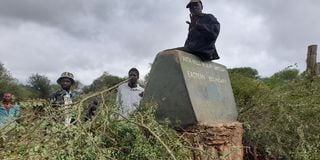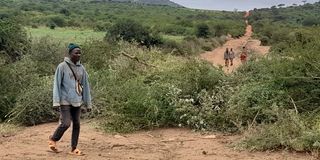KWS seek to evict residents within Tsavo conservancy

A beacon showing the boundary between Taita Hills Wildlife Sanctuary and Alia community land in Mwatate, Taita Taveta County. The residents are accusing the sanctuary of trying to grab their land by allowing KWS to erect an electric fence past the beacon.
Kenya Wildlife Service (KWS) wants a private sanctuary to evict more than 3,500 residents who it says have allegedly declined to allow the construction of an electric fence in Mwatate, Taita Taveta County.
According to a letter signed by Tsavo Conservation Area Senior Warden in charge of community affairs Zainab Salim on May 27, addressed to the manager Taita Hills and Saltlick Lodges, KWS is seeking the interventions of the Taita Hills Wildlife Sanctuary to evict the squatters at Kamtonga-Alia stretch.
Tension has mounted in the area after the residents declined to voluntarily move out of the over 2,000-acre land to allow the construction of the Sh40 million fence.
The sanctuary is claiming ownership of the land where residents had settled since the 1980s. The fence has stalled for over 10 years after the residents moved to court to block KWS from implementing the project.
In the letter, Ms Salim stated that the residents who have settled there have torched several poles and stolen materials meant to construct the fence.
Ms Salim stated that the vandalism had imposed another budget on the organisation and also posed insecurity to the team undertaking the project.
The court had ordered the fencing of the 30 kilometre Kamtonga-Alia to continue after residents sued KWS for encroaching into their land.
"Please note that after the court ruling that the fence has not interfered with the complaints parcel of land and ordered continuation to completion of it, KWS has embarked to complete it as per that court order," the letter said.

Residents block the Lwalenyi access road in Mwatate, Taita Taveta County protesting to construction of an electric fence by KWS. They said over 3,500 Alia community members will be displaced if fence is erected.
Ms Salim urged the sanctuary to act fast and take action on the offenders to avoid further losses and tragedies to the team continuing with the construction works.
"After the exercise commenced, tension by local communities started mounting and by yesterday morning our fence team upon reaching the site reported vandalism suspected it could have been done by those communities who have settled along the fence construction line claiming land ownership," she said.
KWS has also held a meeting with the residents but they declined to allow the project to continue.
However, the locals are now appealing to the State to spare them from the looming eviction and to hasten the process of issuing them with individual title deeds.
Speaking to Nation.Africa on Saturday, residents opposing the project said KWS and the sanctuary want to grab their mineral-rich land instead of minimising persistent wildlife conflict.
"We are the owners of the land and we will not move from this area," vowed the chairperson of Alia Farmers Association Dorah Chao.
She said that the High Court had in 1997, ordered that the land be reverted to the locals.
She blamed the Wildlife agency for the frequent invasions on people’s farms in the county.
KWS was recently forced to use ground and air operations to drive out herds of elephants that had invaded communities in the county. The elephants have also destroyed properties especially tanks in search of water.
Through the Chawia council of elders, the residents petitioned the National Assembly to stop the construction of the fence until a solution towards the dispute is reached.





